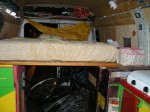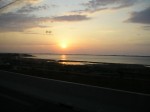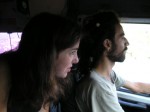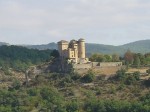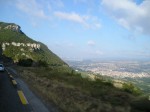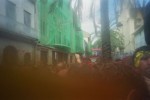Tech sites on the internet are buzzing about Google’s new browser, Chrome, which just launched. Chrome is a big deal for multiple reasons. Partly it’s just the fact that any time Google does anything, techies on the internet flip out about it. It’s also a because Chrome was developed in secret and comes as a big surprise to everyone.
I downloaded it, I tried it, and I’ll say it right now: it’s good. Very good. The interface is clean and intuitive, it uses the WebKit engine also found in Apple’s Safari, which results in fast, accurate page renders. I didn’t run any memory comparisons (I’m sure hundreds of people are doing that already), but it feels much snappier and more responsive than Firefox 3, especially on Vista (I tested on XP and Vista; Google claims Linux and Mac versions are on the way). In many ways, Chrome combines the speed and responsiveness of Opera with an interface I much prefer. The startup page displays your 9 most frequently visited sites, a nice feature ripped off from Opera.
In short, it’s clear that Google put a lot of time and effort into this, which actually makes me very suspicious. Why go to all this trouble? What do they have to gain? It’s not like the world needs another web browser (IE, Firefox, Safari, Opera, Konqueror, Epiphany and K-meleon have that covered, thanks). Google’s released it under a free software license, so they aren’t trying to sell it. They already own the search market, and they pay a lot of money to Mozilla in order to be the default search engine for Firefox, so it’s not like they need Chrome to be a trojan horse for their search engine.
The only thing that makes any sense to me (and the part that makes me really suspicious), is the inclusion of Google Gears support in the browser. Gears is a Google-developed framework for web applications, and it looks to me like their goal with Chrome is to make Gears a must-have application platform. This is a really, really bad idea. It will complicate the lives of web developers endlessly, and you’ll start to see sites that are designed for Gears, not according to common web standards.
The entire thing smacks of Microsoft’s “embrace, extend, extinguish” strategy, where they would move into an area where open-standards prevailed, embrace and support the standards, but then add their own non-standard extensions until those extensions became widely adopted. Then, change their extensions in such a way as to break compatibility with competitor’s products. This looks eerily like what Google’s going for with Gears. Now, Gears is BSD licensed, so it would be very hard for Google to deliberately inhibit compatibility with competing products without changing the license. But even if they don’t break competing products, they will still be in a position of power controlling a “standard” developed internally, by one company, that already has a great deal of power in several key internet sectors (search, context-ads). You’ll likely never be “forced” to use Chrome, but if Google is successful it’s entirely possible you’ll start to see websites that just don’t quite look or work right in other browsers. It will mark a regression, not a progression in the browser market (which has in recent years trended toward ever-greater standards-reliance). It will be like the bad old days when sites were “Designed for Internet Explorer” or “Designed for Netscape Navigator”.


